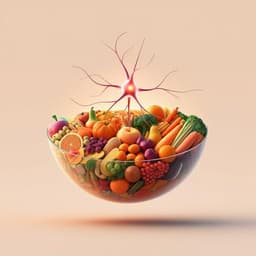
Health and Fitness
Reflections and practical tips from co-producing an intervention with neurodiverse children, their families, and professional stakeholders
H. A. Armitt, L. Attwell, et al.
Explore the challenges and triumphs of co-producing a nature-based intervention for children with ADHD in this enlightening research conducted by Hannah A. Armitt, Leah Attwell, Ellen N. Kingsley, Piran C. L. White, Kat Woolley, Megan Garside, Natasha Green, and Peter A. Coventry. Discover how collaboration, resource allocation, and trust-building make a difference in engaging neurodiverse children and their families!
~3 min • Beginner • English
Introduction
The paper addresses how to effectively implement co-production and co-design with neurodiverse children, their families, and professional stakeholders to create a nature-based intervention for children with ADHD. It situates the work within the broader co-production and transdisciplinary research movement, noting the approach’s potential to enhance research relevance, inclusivity, and impact while sharing power and valuing diverse knowledge. The authors identify a gap in practical guidance for conducting co-production with children with ADHD and set out to reflect critically on the CONIFAS process to share methods, challenges, and lessons learned. The rationale highlights ADHD’s impact on children’s wellbeing and the lack of evidence-informed non-pharmacological interventions that meaningfully involve children in their development, despite evidence that nature exposure may alleviate ADHD symptoms. The study aimed to co-produce a child-oriented, accessible nature-based intervention, addressing priorities to amplify young people’s voices and tailor interventions to complex needs.
Literature Review
The authors review the conceptual bases of co-production and transdisciplinary research, citing their rise across health, sustainability, and climate domains and their promise for inclusivity, power-sharing, and research quality. They note systematic reviews showing that co-research in healthcare remains relatively new, with a lack of clear operational guidance and standards. Specific prior work relevant to ADHD and co-design includes: Fekete and Lucero (2019) on understanding participant culture; Benton et al. (2014) on a Diversity for Design framework for neurodiverse children; and Powell et al. (2021) on a co-designed psychoeducational activity book for children with ADHD. The literature points to the need for detailed methodological accounts, child-centered approaches, and reflexivity in co-production, as well as recognition of challenges around structure versus flexibility, managing power dynamics, and ensuring accessibility and diversity.
Methodology
Design and aim: CONIFAS aimed to co-produce an accessible, engaging nature-based intervention for children with ADHD with children, their parents/guardians, and professional stakeholders. The project ran for 18 months (March 2022–August 2023), sponsored by Leeds and York Partnership NHS Foundation Trust and funded by NIHR RfPB (NIHR203043). Partners included Humber Teaching NHS Foundation Trust, University of York, Yorkshire Wildlife Trust (YWT), and the ADHD Foundation.
Framework: The study followed the Design Council’s Double Diamond model—Discover, Define, Develop, Deliver—mapping onto four research phases: (1) discovery workshops to understand problems and needs around ADHD and nature engagement; (2) co-production workshops to define content, delivery, and format; (3) user-testing of a prototype intervention with new families over six weeks; and (4) refinement with co-producers based on user-testing feedback to prepare for feasibility testing.
Participants: Targeted n=30: 10 children (ages 5–11) with ADHD, each with a parent/guardian, and 10 professionals across relevant roles (e.g., NHS psychology, school staff, Forest School leaders). Inclusion required ability to attend in-person workshops (Barlow Common Nature Reserve, Selby, UK) and sufficient English. Exclusions included risk of harm to self/others or significant additional difficulties precluding participation. Actual participation included 9 children (aged 9–10), 10 parents/guardians, and 10 professionals. Professionals were recruited via networks; families via public advertising through schools, social media, and community venues.
Workshop delivery: Most workshops were held outdoors at Barlow Common Nature Reserve, co-facilitated by researchers and YWT staff. A graphic designer served as a live scribe in sessions. Early phases held separate workshops for professionals, children with parents/guardians, and parents/guardians alone; later phases involved joint sessions. Catch-up calls were offered for missed sessions. Activities included play-based nature tasks (e.g., sensory exploration, nature treasure boxes) to elicit preferences and barriers, and structured discussions guided by aims/objectives. The Define phase included 2–3 hour workshops to finalize content, look/feel, and delivery toward a prototype. Phase 3 user-testing involved 10 new family dyads using the prototype for six weeks with outcome measures and fortnightly support calls (details reported elsewhere). Phase 4 reconvened all co-producers to review user-testing feedback (visually presented) and refine the intervention collaboratively.
Procedures and tools to enhance engagement: The team employed strengths-based, inclusive language; short sessions with regular breaks; refreshments; child-friendly incentives (sticker reward sheets for ‘helpful’ participation); visual aids and timetables; multiple concurrent activities to accommodate varied preferences; 1:1 support for logistics; and the Iriss inclusion checklist (low uptake). The live scribe’s visual notes were shared post-session for reflection and correction. Qualitative field notes and simple qualitative analysis (e.g., content analysis) were used to synthesize themes to feed back to co-producers.
Ethics: Co-production phases were approved by the University of York Department of Environment and Geography REC (23 May 2022); user-testing phase approval on 12 Dec 2022 (DEGERC/Res/01122022/1). Written consent was obtained from parents; child assent was optional.
Key Findings
- Co-production was feasible and valued by participants, yielding a novel nature-based intervention for children with ADHD and positive co-producer feedback on ownership and enjoyment.
- Adequate resourcing and remuneration (vouchers, travel reimbursement, food, goodie bags) supported participation, though transport to a remote site posed barriers for some; greater involvement of families in setting remuneration and appreciation for professionals’ weekend time were identified as improvements.
- Power sharing: While adults felt strong ownership, children’s involvement aligned with Shier’s participation levels 3–4 rather than full power-sharing (level 5). Play-based methods and respectful facilitation enhanced children’s confidence, but time and structural constraints limited deeper day-to-day co-creation; the research team, not participants, physically created the prototype between workshops.
- Blending knowledge: A live scribe improved transparency and accessibility of discussions; sticker-based positive reinforcement and strengths-focused language increased children’s engagement and willingness to express preferences or opt for alternative participation modes.
- Relationships and trust: Co-production fostered respectful, trusting relationships among children, parents/guardians, professionals, and researchers; parental presence supported children’s engagement while allowing independent child-researcher interactions.
- Diversity and inclusion: Despite purposive intentions, diversity was constrained by English-language inclusion and recruitment timing; certain professional roles (e.g., service leads, commissioners, SENCOs) were absent. User-testing broadened diversity somewhat, but sample sizes remained small, potentially limiting generalizability.
- Reciprocity and mutuality: Participants valued the social and nature exposure aspects and received certificates/letters; ongoing communication and opportunities for continued involvement were planned, though research funding timelines challenged sustained mutuality.
- Practical insights: Flexibility was essential, with sessions often deviating from plans to follow children’s needs. Extra staff enabled concurrent activities and individualized support. Visual notes and qualitative synthesis facilitated sense-making in ‘messier’ sessions. A set of practical tips was distilled (e.g., plan for flexibility, build in catch-up opportunities, use live scribing, employ play-based and creative methods, and involve co-producers in tangible product creation).
Discussion
The reflections demonstrate that co-production with neurodiverse children and their families can generate acceptable, accessible, and context-relevant interventions, while also requiring researchers to adopt flexible, facilitative roles and to manage power dynamics consciously. Applying the Double Diamond model provided helpful structure, but effective engagement relied on clinical skills, creativity, iterative adaptation, and relational work. The findings address the study aim by detailing operational practices—resourcing, facilitation techniques, visual communication, play-based engagement, and iterative feedback loops—that made co-production workable and meaningful. They also underscore limits: children’s participation did not reach full power-sharing; diversity and inclusion were constrained; and workshop-to-creation handoffs limited direct co-creation. The results are significant for health and environmental research teams seeking to implement co-production with under-represented groups, highlighting concrete methods to improve accessibility and engagement and identifying common barriers (structural funding constraints, transport, staffing). These insights help bridge the gap in practical guidance noted in the literature and suggest that reflexive, transparent, and resource-conscious approaches can enhance both process quality and intervention relevance.
Conclusion
Critical reflection indicated that CONIFAS sought to adequately resource co-production, share power, value diversity, and build trust. An inclusive, flexible approach enabled equitable engagement and contributed to positive experiences and a sense of empowerment among co-producers. Reconceptualising the researcher role was challenging; while co-production models offered a framework, equitable workshop design and engagement drew on clinical skills, networking, and creativity. The authors recommend adopting co-production methodologies where possible to center lived experience, working flexibly, and communicating with co-researchers about needs and engagement methods. The team will assess the intervention’s effectiveness in future work.
Limitations
- Structural constraints: The NIHR funding call pre-specified research parameters, limiting co-production from inception and contributing to time pressures between phases.
- Limited power-sharing with children: Participation aligned with mid-levels on Shier’s pathway; children did not fully co-create the intervention, which was physically assembled by the research team between workshops.
- Diversity and inclusion: English-language requirement, remote workshop location with limited public transport, and small sample sizes reduced diversity of participants and perspectives; some professional groups (e.g., service leads, commissioners, SENCOs) were not represented.
- Accessibility and logistics: Transport barriers led at least one interested participant to decline participation; visual schedules were difficult to maintain due to session flexibility; the Iriss inclusion checklist had low uptake, delaying awareness of access needs.
- Generalizability and evidence gaps: The paper focuses on reflections rather than outcomes; user-testing details are reported elsewhere, and effectiveness of the co-produced intervention has yet to be established.
Related Publications
Explore these studies to deepen your understanding of the subject.







